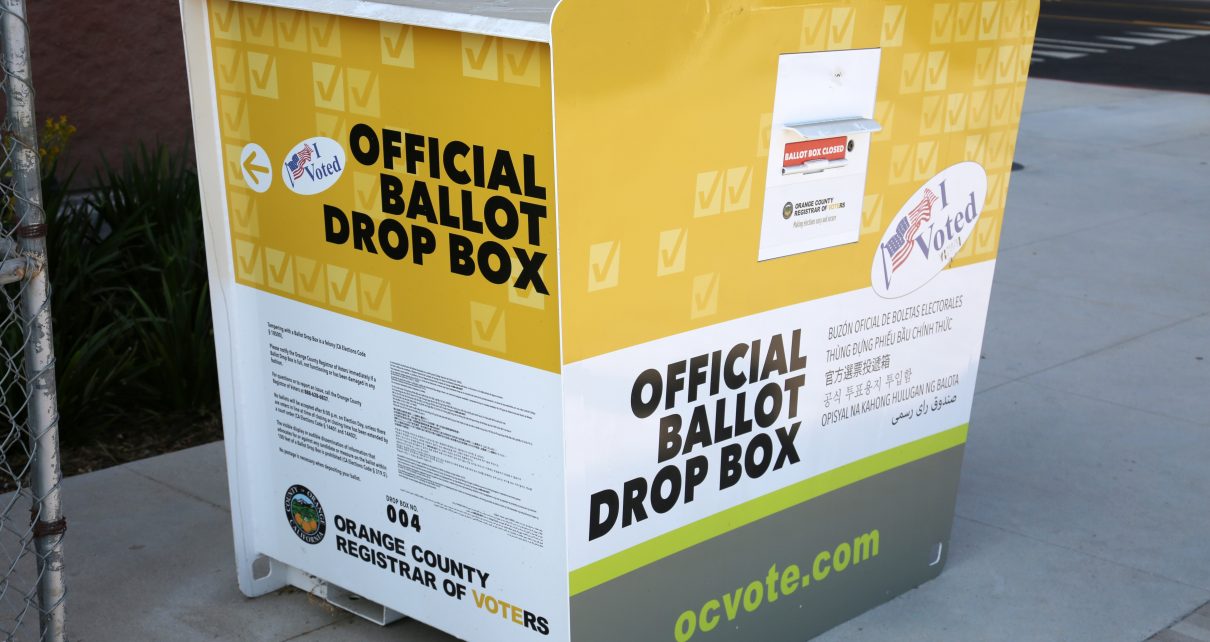
Official Ballot Drop Box placed ready to accept Voting Ballots for the upcoming election. Santa Ana, CA, Sept. 23, 2020. (Photo: mikeledray/Shutterstock)
Why Incumbent Congressional Representatives Michelle Steel and John Duarte Should Have Won
A Case Against California AB 37’s Unconstitutional Provisions and the Need for President Trump’s Nationwide Election Reform Proposals
By Katie Zacharia, January 6, 2025 4:06 pm
In 2020, California’s Assembly Bill 860 fundamentally altered state election laws by requiring county elections officials to mail a vote-by-mail ballot to every registered voter for all elections. The bill allowed ballots postmarked on or before Election Day to be counted seventeen days after the election and permitted the processing of vote-by-mail ballots twenty-nine days before Election Day. In 2021, Assembly Bill 37 was codified and extended these provisions, making universal vote-by-mail permanent for all eligible voters. It also enshrined the extended deadline for receiving and counting ballots to seven days after Election Day. These changes have had a significant impact on tight races in the November 2024 election, including those of Republican Incumbent Representatives Michelle Steel (CA-45) and John Duarte (CA-13), where late-arriving ballots and extended counting periods likely influenced the final results of their respective elections.
While the Fifth Circuit Court of Appeals’ ruling in Republican National Committee v. Wetzel is not binding in California, its constitutional principles are highly relevant. In Republican National Committee v. Wetzel, the Fifth Circuit held that Mississippi’s statute that allowed for absentee ballots postmarked on or before Election Day to be received and counted five days after the federal Election Day was preempted by federal law, which does not allow states to extend the period for accepting and counting ballots beyond Election Day. This holding challenges the legality of AB 37, which creates significant uncertainty in the election process by allowing late-arriving ballots to potentially alter outcomes well after Election Day.
The pandemic-era policies that led to AB 860, and subsequently AB 37, especially the extension of ballot counting deadlines to seventeen days (2020) and seven days (2021), were unconstitutional from the outset. These temporary measures, created to address the challenges of the COVID-19 crisis, were never intended to become permanent fixtures of election law. The prolonged counting period, which was once allegedly justified by public health concerns, is now completely antiquated and should be immediately repealed to restore transparency and confidence in elections.
The Unconstitutional Impact of AB 37
AB 37’s extension of the deadline for receiving and counting mail-in ballots by seven days creates a scenario where the results of elections can be drastically altered in the weeks following the election. Representatives Michelle Steel and John Duarte were both leading on Election Night, only to see their leads diminish as late-arriving ballots — which were postmarked on or before Election Day but received after November 5th, 2024 — were counted. Specifically, with incumbent Michelle Steel’s district, Shawn Steel, the Republican National Committee member, stated that “one-third of the votes counted came in after Election Day” and played a critical role in eroding her lead. If true, one-third of the total votes coming in after Election Day points to serious problems with the voting process and elevates the legitimate concerns around ballot harvesting and other subversive tactics that undermine election integrity. The seven-day extension of the counting period has introduced chaos into the election process, undermining the transparency of the vote and ultimately affecting the outcomes of key races.
President Trump’s Strong Performance in California and the Unconstitutional Disparities in Key Congressional Races
President Trump secured nearly 40% of the vote in California this past November, a historically strong and decisive showing for a Republican candidate in the golden state. In fact, California came in third place in the nation for votes for President Trump, trailing behind the deeply conservative states of Texas and Florida. Statewide, support for President Trump increased by six percentage points from the 2020 election – a significant win for President Trump in a state haunted by the failed policies of his opponent, former U.S. Senator and Attorney General of California and District Attorney of the once great city of San Francisco, Vice President Kamala Harris.
Despite the increasing support for President Trump statewide, the extended mail-in ballot window under AB 37 disproportionately benefited late-arriving ballots, mostly cast for Democratic candidates in otherwise secure incumbent Republican Districts. These extended deadlines, especially in the close races of CA-45 and CA-14, increased the chances that late ballots unfairly tip the scales in favor of the Democrats Derek Tran and Adam Gray, respectively, and unduly hurt the prospects of Republican incumbents who would have otherwise been victorious on election day.
The chart below shows the timeline of a win for incumbent Republican Representative Michelle Steel on election day, and even in the days following, only to be overtaken weeks after Election Day by her opponent Derek Tran.

The Constitutional Framework and the Need for Nationwide Uniformity
The Electors Clause (U.S. Const. art. II, § 1, cl. 4) grants Congress the power to determine the time for selecting presidential electors. Under this authority, Congress initially set a 34-day period for states to appoint electors in 1792 [1], however, after the states’ use of multi-day voting periods which led to fraud, irregularities, and delays, in 1845, Congress standardized the appointment of electors to occur on the “Tuesday after the first Monday in November” [2]. Further, the Elections Clause (U.S. Const. art. I, § 4, cl. 1) allows states to regulate the times, places, and manner of elections for federal offices while granting Congress the power to alter these regulations. Concerns over disparate election dates led Congress to standardize the timing of congressional elections, establishing that all elections for Congress and the Presidency would be held on a single day, the Tuesday after the first Monday in November [3]. Clarified by the Supreme Court in Foster v. Love [4], these provisions require federal elections, including those for Congress and presidential electors, to occur on Election Day, as mandated by federal law.
Extended ballot counting days as outlined in California’s AB 37 (and Mississippi’s five-day extension [5]) directly violate these aforementioned constitutional principles. By permitting an extended period for counting ballots, the law disrupts the uniformity of federal elections, opening the door to confusion and undermining the integrity of the election process. The Fifth Circuit’s ruling in Republican National Committee v. Wetzel recognizes the dangers of prolonged deadlines and the court ruled that extending the election period compromises the core principles of election timing and uniformity enshrined in the Constitution. Likewise, AB 37’s extended counting period thus undermines the very integrity of the electoral process, violating the spirit and intent of both the constitutional provisions in the Electors Clause and Elections Clause and prevailing statutory law.
A Call for Nationwide Election Reform and Voter ID Laws
After accepting the Patriot of the Year award from Fox Nation on December 5th, 2024, President Trump stated, “We want to have paper ballots, one-day voting, voter ID, and proof of citizenship”. President Donald Trump has rightly pointed out the dangers of policies like California’s Senate Bill 1174 [6], which prohibits asking voters for identification at the polls. “In California, they just passed a law that you’re not even allowed to ask a voter for voter ID. Think of that. If you ask a voter for their voter ID, you’ve committed a crime. We’re going to get the whole country straightened out,” President Trump further said.
I have personally traveled throughout California and to many swing states as a political strategist and senior advisor to several initiatives, and people are disillusioned with the inconsistent voting laws that have created widespread doubt and uncertainty. In addition to addressing the overt constitutional concerns of AB 37, President Trump’s proposals for nationwide voter ID and general election reforms would restore confidence in our elections, especially in California, by ensuring that only eligible voters participate in an efficient and timely manner.
Reshaping the California Political Landscape
By allowing ballots to be counted seven days after Election Day, California violated constitutional principles regarding the timing and uniformity of elections and shifted the political landscape of California in the November 2024 election. Incumbent Representatives Steel and Duarte have legitimate grounds for challenging their race outcomes, and Republican National Committee v. Wetzel underscores the urgent need for nationwide election reforms. President Trump’s above-mentioned election policy proposals should be adopted nationwide to ensure bipartisan, fair, transparent, timely, and consistent elections that safeguard against fraud and preserve the integrity of our republic for all voters.
1 Act of Mar. 1, 1792, ch. 8, § 1, 1 Stat. 239.
2 Act of Jan. 23, 1845, ch. 1, 5 Stat. 721, codified at 3 U.S.C. § 1.
3 Act of Feb. 2, 1872, ch. 11, § 3, 17 Stat. 28, codified at 2 U.S.C. § 7.
4 Foster v. Love, 522 U.S. 67 (1997).
- Dear President Trump, Dear America - December 13, 2025
- Voter ID & Proof of Citizenship: The Lynchpin that Saves the Republic - November 13, 2025
- The Greatest Political Athlete of All Time: President Donald J. Trump - November 6, 2025




EXCELLENT account, analysis, and argument (with visuals) in service to returning to reasonable election standards and protocols.
Thank you for it, Katie Zacharia.
Hope readers will share this article far and wide.
I agree that this is an excellent article. My only question isn’t the CAGOP suing to overturn prop 37? If the Federal law already preempts Californias process, why is California allowed to violate this law without it being challenged.
The more handling the more cheating. When working on counting in the 1970’s McGovern vs Nixon, the vote was a referendum on Viet Nam. It was routine to see handliers surreptitiously mark Mc. Govern on a Nixon ballot, thereby voiding it.
The other was filling in races not voted. So if judges and school boards are all you voted on, you may have had the rest of your ballot completed for you.
Today there are more unclaimed ballots and plenty of time to cheat. And “signature curing” is in the eye of the beholder.
Well, this isn’t an article, it is an opinion piece. And, I am not sure what it says about the law school at Pepperdine, but what is the relevance of citing a case that even the author admits “is non-binding in California” ? Don’t even get me started on your graph. So what is your point Katie? You don’t like the outcome of the election because the candidate you backed lost. Please stop whining. And please stop trying to undermine the integrity of our elections. It is dangerous misinformation. (Although, I have to say, I love that one of your readers can offer “eyewitness” accounts of cheating during the McGovern campaign. Oh. Ouch.
1) California has a lot of “blue” money. To fix California more “red”money is needed, a lot more!
2) Nothing will change until an initiative is put on the ballot to correct the corrupt voting system.
3) The proposed ballot initiative will make people aware and motivate them to register,,,see prop 36 effort.
4) The people that write the ballot initiative should also write the summary in the pamphlet.
5) The ballot initiative should address only one issue this year, another issue next year.
Well, as I recall, then Assemblyman Adam Gray was ahead on Election Night in 2022. So by your logic, he should been declared the winner in 2022.